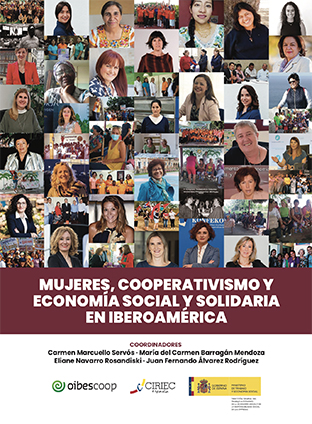The Ibero-American Observatory OIBESCOOP, based at the University of Zaragoza (Spain) has published a new study, this time on a highly topical issue such as ‘Women, Cooperativism and the Social and Solidarity Economy in Ibero-America’. The book has been produced by a working group made up of experts from the OIBESCOOP Network from 14 countries, coordinated by the president of OIBESCOOP, Carmen Marcuello (University of Zaragoza, Spain); María del Carmen Barragán (Autonomous University of Guerrero, Mexico); Eliane Rosandiski, (Pontificia Universidade Católica de Campinas, Brazil), and Juan Fernando Álvarez (Pontifical Javeriana University, Colombia).
The objective has been to recognize the work carried out by different women or groups of women based on their impact and influence on cooperativism and the Social and Solidarity Economy in the different territories of Ibero-America, both in the profesional field and in research, entrepreneurship or project leadership.
The different chapters present the studies carried out for Argentina, Brazil, Chile, Colombia, Costa Rica, Cuba, Ecuador, Spain, Honduras, Mexico, Paraguay, Peru, the Dominican Republic and Venezuela. Each text shows a diverse, rich and nuanced reality. All of them show experiences that share a way of creating networks and processes while highlighting the need for the social economy to also address the challenges observed regarding the role and visibility of women.
Regarding the context, OIBESCOOP highlights that the development of this book has taken place in the midst of the COVID-19 pandemic. In these circumstances in parallel to the recognition sought, many Ibero-American territories have seen increases in domestic violence, sexual harassment, loss of jobs to care for family members, and greater financial pressure on family nuclei where women are heads of households. These aspects influence greater mental and emotional stress and loss of self-esteem. Therefore, recognition has multiple meanings.
It emerges that solidarity enterprises represent spaces for overcoming the various inequalities and poverty that characterize the territories. But these ventures do not always manage to be recognized by the markets and by public policies.
In their role as partners, managers, consumers and workers of the enterprises, women face the challenges imposed by the daily patriarchal environment, which ends up reproducing and normalizing various gender gaps. These challenges embody various strategies of adaptation, resistance, contestation or subordination that can be read in this book.
Education and qualification appear to be the pillars to generate forms of insertion and democratic participation that favour the transformation of the lives of these leaders, their communities and their territories.
The full book can be downloaded here: http://www.oibescoop.org/wp-content/uploads/Mujeres-Coop-y-ESS.pdf







